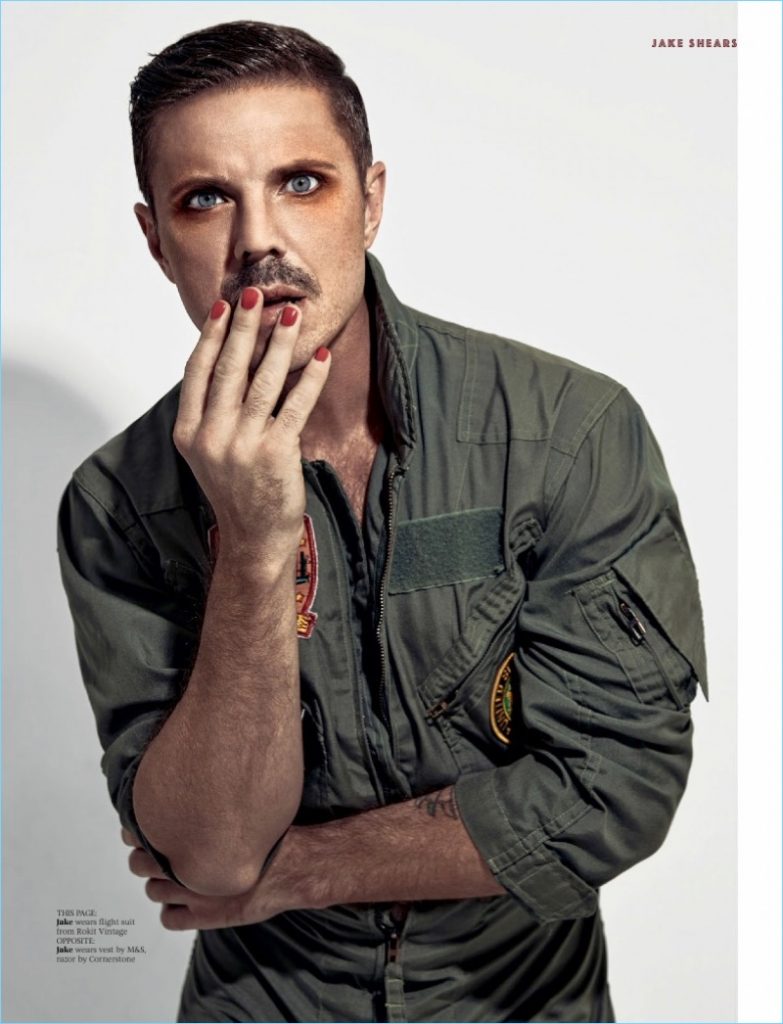 Boys Keep Swinging: A Memoir
Boys Keep Swinging: A Memoir
by Jake Shears
Atria Books. 336 pages, $26.
YOU MIGHT expect an autobiography by Jake Shears, lead singer of the musical group Scissor Sisters, to be chock full of pictures of him and the band. You might also expect it to be a fun book, but essentially superficial. You would be wrong on both counts. What we get instead in Boys Keep Swinging is a compelling story of what it takes to make it in New York, and a wonderful portrait of New York City in the late 1990s and early 2000s. But we also get a fascinating portrait of why someone feels compelled to perform, and what it is about a performer that makes people want to watch him at all.
Jake Shears (real name, Jason Sellards) was born in Mesa, Arizona, in 1978, and was shuttled back and forth between there and Seattle during his school years. A showy, bossy gay kid who watched, unimpressed, as baseballs “plunked on the ground yards away from me, like a dead shooting star,” he found himself instead obsessed with David Bowie, playing with beefy he-man dolls alone in his room, and becoming increasingly obsessed with the fringe aspects of suburban culture. He hung out at a place called The Edge, where he marveled at the strange assemblage of society’s outliers: “vampy ladies, unhygienic introverts, square professionals, bored housewives, teenage queers, potheads, hookers and musicians.” He also confesses to being blown away by the “upscale-trash aesthetic” of the Playboy Channel.
All the while he was (barely) concealing his nascent sexuality, but he was also concealing a kind of rage against the prevailing straight culture that surrounded him. What began with dressing outrageously as a kind of defiance and a way to cultivate attention for being different culminated in an episode in which he had sex with an Abercrombie-perfect kid, then outed him to the entire school. He calls the betrayal a mistake, but what he concludes about the incident is both interesting and telling, considering his eventual career:

I’d outed him. I’d played the locker-room jock, bragging about a sexual victory, and by doing that, I’d felt a kind of power I’d never had, the sensation of putting somebody in their place. No one at school would have been inclined to bully him, but he now carried the label of being gay. I might have seemed adjusted and happy with myself, but the anger from the abuse that I’d taken in Arizona was still alive and well. It was a toxic, sick victory, and I was filled with a hollow satisfaction over finally having made someone else know what it felt like to be a fag.
A few years later, Shears would satisfy his need for attention and cash by dancing as a go-go boy in various gay bars. He also began to revel in the fact that, as a gay man, he had become an object of desire and power. Dancing and performing made Shears feel that he was doing what he was born to do, and it led him to a further revelation: ”The attention that I need is for the expulsion of pain, in turn transforming it into a tangible thing that people might connect with. Straw to gold, water to wine. This was never just to feel accepted; that’s never been my driving force. It’s a pageant on the proscenium of my heart.” As these examples attest, Shears is thinking about his career a lot more deeply than one might at first suspect, and it makes for thought-provoking reading.
The middle third of Boys Keep Swinging traces Shears’ move to New York, his early attempts to figure out who he was and how he wanted to channel his energy. The book is alternately comic, appalling, and exhausting, as it details the many people he met and, occasionally, slept with, including such future luminaries as Anderson Cooper (an early boyfriend). He also meets Debbie Harry early on. After dancing in a G-string at one of her events, he tells her, embarrassingly enough: “I think my dick looked really small.”
These episodes are dishy and fun, and they illustrate Shears’ relentless drive to become famous, even when he wasn’t at all certain what it was he wanted to become famous for. They are a catalogue of ambition, survival, and excess. As he says about his frequent nudity in the bars those days: “There’s something kind of sweet about people feeling free enough to do whatever they want in plain sight.” It’s a period when he compares being out on the town to a kind of crap shoot, when there was no way of telling whose apartment or penthouse, or whose bed, he’d find himself in next.
After early stints at various publications, including Paper magazine (where the directive from the editor was: “I want cool kids doing fabulous things!”), he finally hooked up with the members of the band who would eventually form the core of Scissor Sisters: Scott Hoffman (eventually christened “Babydaddy”), a friend of a college friend, and Ana Matronic, hostess at a local nightclub called The Slipper Room. But success was still a steep road to climb. Once he did start to make it as a star, he wrestled with the paradox of fame, comparing it to making a commitment to riding in the Space Shuttle for years: the view is amazing, but you also sacrifice a lot to be there.
It’s also interesting to note the crucible out of which Scissor Sisters came into being: almost literally from the depths of despair surrounding the fall of the World Trade Towers. (Shears’ apartment was in the evacuation zone.) People were sad, he concluded, and needed to be entertained, He implies that only out of the cauldron of such dire circumstances could music as giddily transgressive and flamboyant as theirs have been born. As any Scissor Sisters fan knows, it is the curious mixture of glib defiance that defines the band, that makes such early songs as “Comfortably Numb “ (the song that initially made them famous), “Tits on the Radio,” “Filthy/Gorgeous,” or “Mary” such a strange and affecting combination of exhilaration, defiance, and pathos.
In the end, of course, the band had its run, going on hiatus after its fourth album, though Shears has a new solo album coming out soon. Boys Keep Swinging makes for an entertaining reading experience, and an informative one, as it offers a penetrating look into the music business. But it’s also about the quest for stardom, and what one might find at the end of a disco-lit path.





